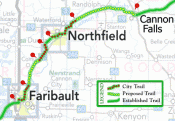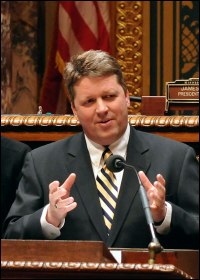Raiding the Piggy Bank
Imagine Junior working and saving for years, pocketing part of the money he earns on his paper route, hoping to squirrel away enough money for a down payment on his college education. That’s a nice story until Dad breaks open the piggy bank to skim off some funds that he says aren’t being used.
The same story is being played out in the Minnesota state budget. Workers forward part of their hard earned pay into dedicated funds only to see the Governor raiding their piggy banks to transfer the money to the General Fund. Last year the Governor proposed eliminating the Health Care Access Fund and transferring all provider tax revenues into the general fund. Why should the Health Care Access Fund serve as a slush fund to pay for projects unrelated to health care or to balance the state’s budget?
This year we learned the Governor’s supplemental Budget was to transfer $267,000 from the snowmobile dedicated account and another $400,000 from the ATV account to the General Fund. Only after organized outrage from these groups did the Governor back down from that proposal.
Electrical contractors are seeing a $1.5 million transfer from the Construction Codes and Licensing Division’s continuing education fund to the General fund. These dollars were paid for by electrical contractors from across the state to offset costs related to education courses, seminars and registration fees for necessary ongoing and required training.
Pick up the daily paper and you will read more of the same. The Star Tribune reported today the Governor’s supplemental budget calls for $1.2 million to be taken from the state’s Water Recreation Account – funds generated by the 860,000 boaters in the form of fee and boat registration – and transferred to the General Fund. Projects that include boat ramps and canoe and boat route management get axed.
More and more of our dedicated funds are not finding their way to their original and intended purpose. Those paying into these various funds are left holding a broken piggy bank with less incentive to continue paying. They are angry and rightfully so. Allowing this practice is a dangerous precedent and will lead to further raiding of our dedicated accounts.

 The US Fish and Wildlife Service has been purchasing land in the Minnesota River Valley with the intent to provide additional acreage to the National Wildlife Refuge already in place there. That is an admirable and worthwhile goal. Unfortunately, they have decided to ban snowmobile use on newly acquired lands, specifically on trails that have been in existence there since the 1970s. These trails have successfully co-existed with those uses outlined in the Fish and Wildlife Service’s guidelines since the trail’s inception. Snowmobiling groups and I have been working with our representatives in Congress as well as those at the Fish and Wildlife Services in hopes of finding a solution to the problem before the first snowfall. Even a waiver for conditional use of the established Grant-in-Aid snowmobile trail this winter season seems to be a reasonable compromise.
The US Fish and Wildlife Service has been purchasing land in the Minnesota River Valley with the intent to provide additional acreage to the National Wildlife Refuge already in place there. That is an admirable and worthwhile goal. Unfortunately, they have decided to ban snowmobile use on newly acquired lands, specifically on trails that have been in existence there since the 1970s. These trails have successfully co-existed with those uses outlined in the Fish and Wildlife Service’s guidelines since the trail’s inception. Snowmobiling groups and I have been working with our representatives in Congress as well as those at the Fish and Wildlife Services in hopes of finding a solution to the problem before the first snowfall. Even a waiver for conditional use of the established Grant-in-Aid snowmobile trail this winter season seems to be a reasonable compromise.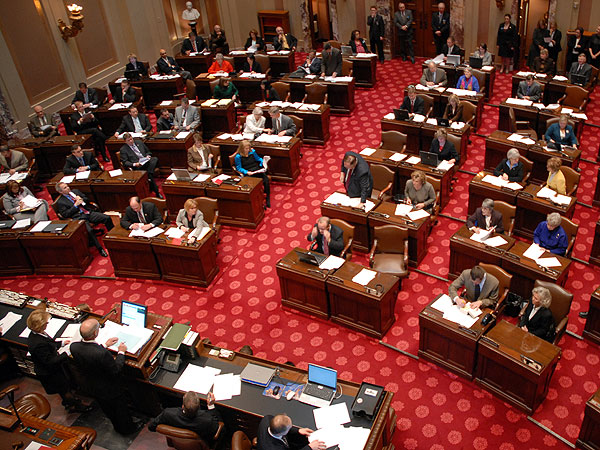 From now until the 2010 election, we will hear the steady drumbeat from the opposition critical of legislators and their work during the 2009 legislative session, specifically dealing with the unprecedented $6.4 budget deficit. I am okay with that. As an elected official, I understand we will be subject to criticism, right or wrong. The people’s freedom to express themselves is essential in a representative democracy.
From now until the 2010 election, we will hear the steady drumbeat from the opposition critical of legislators and their work during the 2009 legislative session, specifically dealing with the unprecedented $6.4 budget deficit. I am okay with that. As an elected official, I understand we will be subject to criticism, right or wrong. The people’s freedom to express themselves is essential in a representative democracy.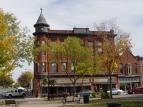 Imagine a community that gives its citizens more choices about where they live and how they get around. Instead of policies that promote urban sprawl, how about a community that encourages more compact development, saving infrastructure costs and accessibility. Why not consider a town built around jobs, schools, and services supporting walking and biking in daily life, reducing obesity and other health risks.
Imagine a community that gives its citizens more choices about where they live and how they get around. Instead of policies that promote urban sprawl, how about a community that encourages more compact development, saving infrastructure costs and accessibility. Why not consider a town built around jobs, schools, and services supporting walking and biking in daily life, reducing obesity and other health risks.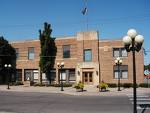 Several constituents in the New Prague and Belle Plaine area have concerns about the CapX2020 project. CapX2020 is a joint initiative of 11 transmission-owning utilities in Minnesota and the surrounding region to expand the electric transmission grid. The transmission lines will be built in phases and several residents have concerns about the line’s route and the impact this project will have on their lives. Representative David Bly and I have introduced legislation to address some of their concerns.
Several constituents in the New Prague and Belle Plaine area have concerns about the CapX2020 project. CapX2020 is a joint initiative of 11 transmission-owning utilities in Minnesota and the surrounding region to expand the electric transmission grid. The transmission lines will be built in phases and several residents have concerns about the line’s route and the impact this project will have on their lives. Representative David Bly and I have introduced legislation to address some of their concerns.
